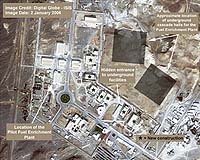 |
Washington (AFP) Feb 8, 2010 The United States and France said Monday they will push for "strong" new UN anti-nuclear sanctions against Iran after the Middle East state announced it was going to step up its uranium enrichment. Iran's move to boost its enrichment capacity again surprised Western nations who fear that the Islamic republic is trying to develop its own nuclear weapon. French President Nicolas Sarkozy and US Defence Secretary Robert Gates agreed in talks that tough new sanctions must be passed against Iran, the French presidency said. Sarkozy and Gates "agreed that the time has come for the adoption of strong sanctions, in the hope that dialogue will be resumed," an official at the French presidency said after a meeting in Paris between the two leaders. French Defence Minister Herve Morin, speaking after earlier talks with Gates, said: "We have no choice but to work on other measures." Gates, in an interview with the US Fox News program, said Iran had been given "multiple opportunities" to provide reassurances of their intentions and their response "has been consistently disappointing." "And so now I think we're in a position to turn to the pressure track and get broad international support for some serious sanctions, in terms of trying to give the Iranian government to change its approach," he added. Tensions have been heightened by Iran's announcement to the International Atomic Energy Agency (IAEA) that it would start enriching uranium to 20 percent from Tuesday. The IAEA, backed by the international powers, had proposed a deal which envisages 3.5 percent uranium being sent to Russia and France for enrichment to 20 percent and then returned as fuel for a research reactor in Iran. A nuclear weapon would require enrichment to 90 percent. Iran's announcement came less than a week after it signaled support for the UN-drafted deal. IAEA director general Yukiya Amano was worried about Iran's decision to begin higher enrichment, a spokeswoman said. "Amano noted with concern this decision, as it may affect, in particular, ongoing international efforts to ensure the availability of nuclear fuel for the Tehran research reactor," said Gill Tudor. "The director general reiterated the agency's readiness to play an intermediary role," she added. Germany said Iran's announcement showed it was not cooperating with the international community. Britain's Foreign Office said Iran's "contradictory rhetoric" was "deeply worrying". A top Russian lawmaker called it "a sure step backward" and suggested new sanctions should be discussed -- a step Moscow has previously opposed. "The international community should... send Tehran a new message about its intention to react with serious measures -- to the point of tougher economic sanctions," said Konstantin Kosachev, who heads the Russian parliament foreign affairs committee. Russia's foreign ministry said Iran must send its uranium abroad as a way out of the impasse, Interfax news agency reported. Nevertheless, French Foreign Minister Bernard Kouchner warned that it may take time to secure a new UN sanctions resolution. Work on a resolution has begun at UN headquarters in New York, with the Americans and Europeans proposing sanctions that could target energy products, Kouchner told reporters. But he warned that a resolution might not win the nine votes needed in the 15-member council. "We haven't yet convinced the Chinese," he said. "Will our Chinese friends put up a major obstacle?" Israeli Defence Minister Ehud Barak urged "decisive and permanent sanctions" against the Islamic republic. Australian Foreign Minister Stephen Smith said Iran's move was a "serious provocation" that would constitute a clear breach of UN resolutions. In Ottawa, Foreign Affairs Minister Lawrence Cannon said Canada was "deeply disappointed" by Iran's decision, and would work with the international community "toward a solution that will hold Iran to account." burs-km/fgf/ao
Share This Article With Planet Earth
Related Links Learn about nuclear weapons doctrine and defense at SpaceWar.com Learn about missile defense at SpaceWar.com All about missiles at SpaceWar.com Learn about the Superpowers of the 21st Century at SpaceWar.com
 Defiant Ahmadinejad orders higher enrichment of uranium
Defiant Ahmadinejad orders higher enrichment of uraniumTehran (AFP) Feb 7, 2010 President Mahmoud Ahmadinejad on Sunday ordered Iran's atomic chief to begin higher uranium enrichment, raising the stakes in a dispute with the West days after seeming to accept a UN-drafted nuclear deal. Ahmadinejad's declaration drew immediate fire from Britain, which said it was "clearly a matter of serious concern," while US Defence Secretary Robert Gates called for mounting "internatio ... read more |
|
| The content herein, unless otherwise known to be public domain, are Copyright 1995-2010 - SpaceDaily. AFP and UPI Wire Stories are copyright Agence France-Presse and United Press International. ESA Portal Reports are copyright European Space Agency. All NASA sourced material is public domain. Additional copyrights may apply in whole or part to other bona fide parties. Advertising does not imply endorsement,agreement or approval of any opinions, statements or information provided by SpaceDaily on any Web page published or hosted by SpaceDaily. Privacy Statement |